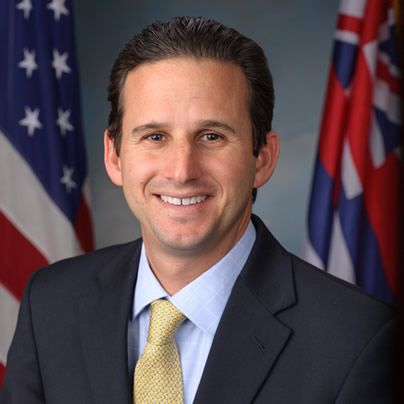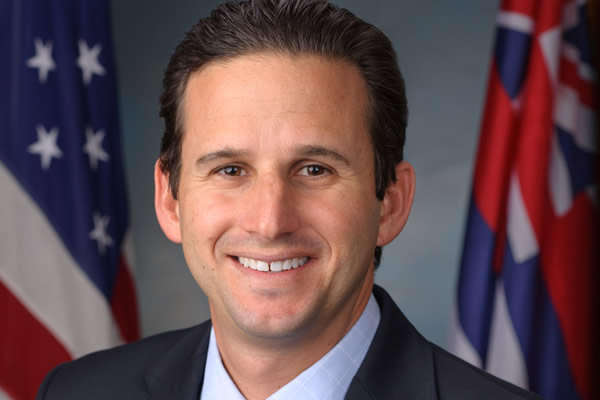News
Schatz introduces bill for discharged gay veterans
‘Restore Honor to Service Members Act’ would streamline process to change paperwork


Sen. Brian Schatz (D-Hawaii) has introduced a bill to aid discharged gay veterans. (Photo public domain)
A Hawaii Democrat introduced on Thursday new legislation in the U.S. Senate that would ensure gay veterans discharged because of their sexual orientation have the designation of “honorable” discharge on their records.
The bill, known as the Restore Honor to Service Members Act, would apply to gay veterans who were in service prior to the lifting of “Don’t Ask, Don’t Tell” in 2011, when the U.S. military expelled troops for being openly gay.
Sen. Brian Schatz (D-Hawaii), the chief sponsor, said “Don’t Ask, Don’t Tell” repeal was “a watershed moment,” but his bill would address remaining issues for the estimated 114,000 service members expelled because of their sexual orientation since World War II.
“Yet thousands of former service members still bear the scars of that discrimination, with their military records tarnished with discharges other than honorable and marks on their records that compromise their right to privacy,” Schatz said. “Many of these brave men and women that served our country are currently barred from benefits that they earned and are entitled to, and in the most egregious cases they are prevented from legally calling themselves a veteran. This needs to be corrected now.”
Although many service members were given an “honorable” discharge from the military if they were expelled because of their sexual orientation, others were given “other than honorable,” “general discharge” or “dishonorable” discharge.
As a consequence, these former troops may be disqualified from accessing certain benefits, such as GI bill tuition assistance and veterans’ health care, and may not be able to claim veteran status. In some cases, they may be prevented from voting or have difficulty acquiring civilian employment.
Even troops who received “honorable” discharges may have difficulties in the aftermath of their service because their sexual orientation may be identified as the reason for the discharge.
Although an administrative process already exists for service members to change their records, the proposed legislation would streamline the process to ensure these designations don’t impair former members of the armed forces.
Joining Schatz in introducing the legislation is Sen. Kirsten Gillibrand (D-N.Y.), who said allowing service members to change their discharges if they were expelled because of their sexual orientation demands immediate attention.
“A clean, honorable record is long overdue for veterans who were discharged solely because of who they love,” Gillibrand said. “Our veterans served our country courageously and with dignity and we must act to give them the appropriate recognition they deserve.”
The legislation has 17 co-sponsors — all Democrats. They are Mark Udall (D-Colo.), Mazie Hirono (D-Hawai‘i), Amy Klobuchar (D-Minn.), Al Franken (D-Minn.), Mark Begich (D-Alaska), Gillibrand, Ed Markey (D-Mass.), Ron Wyden (D-Ore.), Michael Bennet (D-Colo.), Ben Cardin (D-Md.), Maria Cantwell (D-Wash.), Chris Murphy (D-Conn.), Barbara Boxer (D-Calif.), Robert Menendez (D-N.J.), Martin Heinrich (D-N.M.), Cory Booker (D-N.J.) and Charles Schumer (D-N.Y.).
Denny Meyer, national public affairs officer for the LGBT group known as American Veterans for Equal Rights, said her organization supports the bill.
“LGBT veterans who served and sacrificed in silence during World War II, Korea, and Vietnam, as well as those who served before and during ‘Don’t Ask Don’t Tell’ in the Gulf War, Iraq, and Afghanistan, deserve to see their service recognized and honored at long last,” Meyer said. “We endorse and support the efforts by Senators Schatz and Gillibrand and Congressmen Pocan and Rangel to move forward the Restoring Honor to Our Service Members Act, which will accelerate discharge upgrades.”
In joint statement, gay Rep. Mark Pocan (D-Wis.) and Charlie Rangel (D-N.Y.), who are taking the lead on the legislation in the House, commended the senators for introducing the Senate companion.
“This bill would close the book on “Don’t Ask Don’t Tell” and provide tens of thousands of gay veterans, who selflessly risked their lives for our nation,” Pocan and Rangel said. “Our bill already has the support of more than 140 House members, and we look forward to working with Senators Schatz and Gillibrand to ensure it can pass Congress and get to the President’s desk.”
Upon the introduction of the bill in July 2013, Rangel said during a conference call with Pocan he wants the White House and the Pentagon to support the legislation.
“We’re hoping we get this involved in the Department of Defense,” Rangel said at the time. “We hope, too — we haven’t talked about it, Mark — but there’s no question we’re looking to get White House support as well.”
Seven months later at the time of Senate introduction, the White House still hasn’t spoken out. The White House didn’t immediately respond to a request to comment on the bill.

Maryland Gov. Wes Moore on Thursday signed a bill that seeks to combat efforts to ban books from state libraries.
House Bill 785, also known as the Freedom to Read Act, would establish a state policy “that local school systems operate their school library media programs consistent with certain standards; requiring each local school system to develop a policy and procedures to review objections to materials in a school library media program; prohibiting a county board of education from dismissing, demoting, suspending, disciplining, reassigning, transferring, or otherwise retaliating against certain school library media program personnel for performing their job duties consistent with certain standards.”
Moore on Thursday also signed House Bill 1386, which GLSEN notes will “develop guidelines for an anti-bias training program for school employees.”

The Mexican Senate on Thursday approved a bill that would ban so-called conversion therapy in the country.
Yaaj México, a Mexican LGBTQ rights group, on X noted the measure passed by a 77-4 vote margin with 15 abstentions. The Chamber of Deputies, the lower house of Mexico’s congress, approved the bill last month that, among other things, would subject conversion therapy practitioners to between two and six years in prison and fines.
The Senate on its X account described conversion therapy as “practices that have incentivized the violation of human rights of the LGBTTTIQ+ community.”
“The Senate moved (to) sanction therapies that impede or annul a person’s orientation or gender identity,” it said. “There are aggravating factors when the practices are done to minors, older adults and people with disabilities.”
Mexico City and the states of Oaxaca, Quintana Roo, Jalisco and Sonora are among the Mexican jurisdictions that have banned the discredited practice.
The Senate in 2022 passed a conversion therapy ban bill, but the House of Deputies did not approve it. It is not immediately clear whether President Andrés Manuel López Obrador supports the ban.
Canada, Brazil, Belgium, Germany, France, and New Zealand are among the countries that ban conversion therapy. Virginia, California, and D.C. are among the U.S. jurisdictions that prohibit the practice for minors.
The White House
Four states to ignore new Title IX rules protecting transgender students
Biden administration last Friday released final regulations

BY ERIN REED | Last Friday, the Biden administration released its final Title IX rules, which include protections for LGBTQ students by clarifying that Title IX forbids discrimination based on sexual orientation and gender identity.
The rule change could have a significant impact as it would supersede bathroom bans and other discriminatory policies that have become increasingly common in Republican states within the U.S.
As of Thursday morning, however, officials in at least four states — Oklahoma, Louisiana, Florida, and South Carolina — have directed schools to ignore the regulations, potentially setting up a federal showdown that may ultimately end up in a protracted court battle in the lead-up to the 2024 elections.
Louisiana State Superintendent of Education Cade Brumley was the first to respond, decrying the fact that the new Title IX regulations could block teachers and other students from exercising what has been dubbed by some a “right to bully” transgender students by using their old names and pronouns intentionally.
Asserting that Title IX law does not protect trans and queer students, Brumley states that schools “should not alter policies or procedures at this time.” Critically, several courts have ruled that trans and queer students are protected by Title IX, including the 4th U.S. Circuit Court of Appeals in a recent case in West Virginia.
In South Carolina, Schools Supt. Ellen Weaver wrote in a letter that providing protections for trans and LGBTQ students under Title IX “would rescind 50 years of progress and equality of opportunity by putting girls and women at a disadvantage in the educational arena,” apparently leaving trans kids out of her definition of those who deserve progress and equality of opportunity.
She then directed schools to ignore the new directive while waiting for court challenges. While South Carolina does not have a bathroom ban or statewide “Don’t Say Gay or Trans” law, such bills continue to be proposed in the state.
Responding to the South Carolina letter, Chase Glenn of Alliance For Full Acceptance stated, “While Supt. Weaver may not personally support the rights of LGBTQ+ students, she has the responsibility as the top school leader in our state to ensure that all students have equal rights and protections, and a safe place to learn and be themselves. The flagrant disregard shown for the Title IX rule tells me that our superintendent unfortunately does not have the best interests of all students in mind.”
Florida Education Commissioner Manny Diaz also joined in instructing schools not to implement Title IX regulations. In a letter issued to area schools, Diaz stated that the new Title IX regulations were tantamount to “gaslighting the country into believing that biological sex no longer has any meaning.”
Governor Ron DeSantis approved of the letter and stated that Florida “will not comply.” Florida has notably been the site of some of the most viciously anti-queer and anti-trans legislation in recent history, including a “Don’t Say Gay or Trans” law that was used to force a trans female teacher to go by “Mr.”
State Education Supt. Ryan Walters of Oklahoma was the latest to echo similar sentiments. Walters has recently appointed the right-wing media figure Chaya Raichik of Libs of TikTok to an advisory role “to improve school safety,” and notably, Raichik has posed proudly with papers accusing her of instigating bomb threats with her incendiary posts about LGBTQ people in classrooms.
The Title IX policies have been universally applauded by large LGBTQ rights organizations in the U.S. Lambda Legal, a key figure in fighting anti-LGBTQ legislation nationwide, said that the regulations “clearly cover LGBTQ+ students, as well as survivors and pregnant and parenting students across race and gender identity.” The Human Rights Campaign also praised the rule, stating, “rule will be life-changing for so many LGBTQ+ youth and help ensure LGBTQ+ students can receive the same educational experience as their peers: Going to dances, safely using the restroom, and writing stories that tell the truth about their own lives.”
The rule is slated to go into effect Aug. 1, pending any legal challenges.
****************************************************************************

Erin Reed is a transgender woman (she/her pronouns) and researcher who tracks anti-LGBTQ+ legislation around the world and helps people become better advocates for their queer family, friends, colleagues, and community. Reed also is a social media consultant and public speaker.
******************************************************************************************
The preceding article was first published at Erin In The Morning and is republished with permission.
-

 State Department4 days ago
State Department4 days agoState Department releases annual human rights report
-

 District of Columbia2 days ago
District of Columbia2 days agoCatching up with the asexuals and aromantics of D.C.
-

 South America2 days ago
South America2 days agoArgentina government dismisses transgender public sector employees
-

 Politics5 days ago
Politics5 days agoSmithsonian staff concerned about future of LGBTQ programming amid GOP scrutiny












